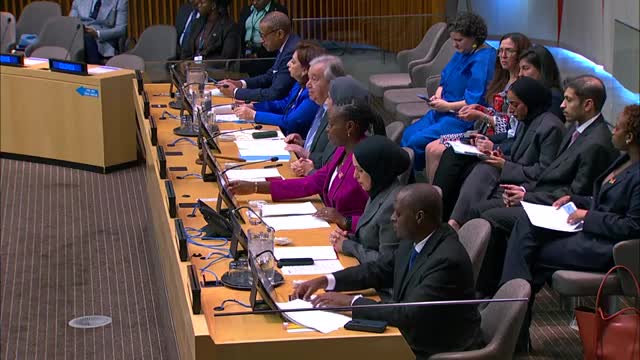UN official calls 2025 a “year of reckoning,” urges accelerated action on gender equality and internal parity
Get AI-powered insights, summaries, and transcripts
Subscribe
Summary
A United Nations official urged member states to step up investments and policy action on gender equality, highlighted progress and remaining gaps in UN system gender parity, and launched a system-wide acceleration plan to reach 50/50 by 2028.
A United Nations official addressed delegates at a UN event, saying 2025 is both a celebration of past milestones and "a year of reckoning" for gender equality and urging member states and UN entities to accelerate action to meet global commitments.
The official said 2025 marks anniversaries of major agreements that advanced women's rights — 25 years since United Nations Security Council Resolution 1325 on women, peace and security and 30 years since the Beijing Declaration and Platform for Action — and warned that progress has slowed. "But the truth is 2025 is also a year of reckoning," the official said, adding that the world is "far from delivering on the promises of the sustainable development goals, including SDG 5, achieving gender equality and empowering all women and girls."
Why it matters: the speaker linked gender equality to broader development goals and to current international priorities. The official called on member states to implement commitments in the recently adopted Pact for the Future and to back measures such as greater investment in the Sustainable Development Goals, expanded debt-relief measures, and support from multilateral development banks so governments can fund education, training, job creation and social protections that foster gender equality.
The speech combined global and internal organizational priorities. On UN staffing, the official said progress has been significant but uneven: in 2017 only five UN entities had reached gender parity; today 28 have. The official said the UN has "achieved and more importantly maintained gender parity among senior leadership and resident coordinators since 2020" and for the first time reached parity in international professional categories. Still, the official warned, "progress remains uneven with critical obstacles along the way," noting continuing gaps at senior professional (P5) and UN levels and in field locations.
The official provided several numeric details about remaining gaps: with a goal of a 50/50 balance across the UN system by 2028, women make up "only 14% of the resident coordinators at the assistant secretary-general level," and in a majority of peacekeeping operations the share of women "does not exceed 35%." The official emphasized that "achieving gender parity is not about numbers alone. Representation without transformation is not enough." The statement called out patriarchal structures within institutions as barriers to women’s leadership and access to economic and legal protections.
The official highlighted UN tools and initiatives intended to change institutional culture and accountability, including field-specific enabling environment guidelines, a UN system-wide knowledge hub on addressing sexual harassment, a UN system-wide dashboard on gender parity, and more than 650 UN gender focal points across the system. To accelerate implementation, the official said they launched "the UN system-wide gender equality acceleration plan," describing it as a governance mechanism across 43 UN entities that integrates reporting into existing accountability frameworks to raise the bar for gender mainstreaming.
On the broader agenda, the official urged protection of civil society space and grassroots organizations and sought accelerated action on topics ranging from women’s participation in peace and security to closing the gender digital divide, referencing the Global Digital Compact. "We must push back against this pushback," the official said, and called on member states to "support no effort, to spare no effort to implement" commitments in the Pact for the Future and other frameworks.
The address closed with a summary of the stakes: "Gender equality is more than an aspiration. It's a human right, and the fundamental requirement for breaking cycles of poverty, violence, and inequality," the official said, and urged collective action to turn commitments into measurable results.
Details from the speech indicate a mix of institutional progress and outstanding gaps that the official said require coordinated member-state support, investment, and internal UN reforms to meet the stated 2028 parity target.
